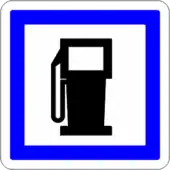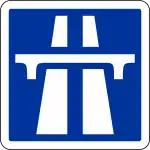A89 autoroute
The A89 autoroute is an autoroute in central France. It is known as the La Transeuropéenne. It connects Bordeaux (from Libourne) and Lyon (at Limonest) via Clermont-Ferrand. Its total length is 544 km (338 mi).
| |
|---|---|
| La Transeuropéenne | |
 | |
| Route information | |
| Part of | |
| Length | 544 km (338 mi) |
| Existed | 1991–present |
| Major junctions | |
| West end | Bordeaux |
| East end | Lyon |
| Highway system | |
| Autoroutes of France | |
The project started in 1991 and was completed in 2018. It was mainly built by the construction of a new road and the re-use of a large part of the A72 built in the 1980s. The autoroute has taken the number of the national road it runs along, the N89.
Of the 544 kilometers in service: 167 km is between Libourne and Brive, 175 km between Saint-Germain-les-Vergnes and Combronde and 143 km between Clermont-Ferrand and Limonest. It is a concession of the Autoroutes du Sud de la France with the exception of the last section, 5 km between La Tour-de-Salvagny and Limonest was conceded to Autoroutes Paris-Rhin-Rhône.
In order to ensure the continuity of the numbers, following the opening of the section between the Saint-Julien-Sancy interchange and the Combronde junction in early 2006, the common core of the A71 motorway now bears both names (A71-A89), while the A710 and A72 autoroutes between Clermont-Ferrand and Balbigny, have been renamed the A89.
History
This transversal autoroute was intended as a powerful tool to open up the center of France, previously connected only to Paris, and a faster link between the second and sixth largest urban areas of France, that of Lyon and Bordeaux. Its commercial name is therefore La Transeuropéenne. It is also nicknamed the Autoroute des Présidents[1] because it crosses the fiefdoms of several French Presidents, Valéry Giscard d'Estaing, Jacques Chirac and Francois Hollande, and it passes close to that of Georges Pompidou. Because of the environmental sensitivity of the Parc naturel régional des volcans d'Auvergne especially the visual impact of such work, it was chosen not to cross the Chaîne des Puys in the middle. As it approached the area, the autoroute heads north-east to get around the volcanoes, depriving Clermont-Ferrand of direct access to the autoroute from the west.
Open sections
The A89 motorway is divided into several sections:
- Libourne - Périgueux - Thenon - Terrasson-Lavilledieu - Brive;
- Saint-Germain-les-Vergnes - Tulle - Ussel - Saint-Julien-Puy-Lavèze - Combronde;
- Combronde - Clermont-Ferrand: common link (double numbered) by the A71;
- Clermont-Ferrand - Thiers - Balbigny (formerly A72, renamed A89 in 2006);
- Balbigny - The Tour-de-Salvagny.
The section of Arveyres at Saint-Julien-Puy-Lavèze, 288 km long, was declared a public utility on 10 January 1996.[2] The section between Peyrignac and Cublac was also on 12 July 2005.[3]
Section from Balbigny to La Tour-de-Salvagny
Work began on 28 June 2008 with the digging of the first 3.9 km tunnel between Violay (Loire) and Joux (Rhône). From a distance of 49.5 km, including 31.5 km in the Loire, this motorway section also connected Roanne to La Tour-de-Salvagny at the entry to Lyon, via Balbigny. The project cost €1.5 billion.
In September 2010, the Viaduc du Torranchin at Pontcharra-sur-Turdine was the first structure completed on this section. This 196-meter-long, 21.55-meter-wide structure, costing €11 million, was built by Eiffage Travaux Publics, Eiffel Construction Métallique and the Forézienne d'Entreprises.
In total, ten exceptional structures were built: seven viaducts, the most spectacular of which is the Viaduc de Goutte Vignole (618 meters), and three tunnels: Tunnel de Violay (3 900 m), tunnel of La Bussière ( 1,050 m) and the Chalosset tunnel (750 m). The A89 has 2 × 3 lanes of 5 km on each side of the Tunnel de Violay.
This section, however, was included in the national master plan for infrastructure in the 1970s, before being abandoned in 1975 following the oil crisis. The section, crossing the sectors of the lower valley of the Azergues and Beaujolais, were contested by the agricultural areas and by a strong urban area (near Villefranche-sur-Saône). Despite the refusal by the associations, including a coordinating committee against the highway in Beaujolais (3CAB), which preferred the development of a national road with 2 × 2 lanes, the preliminary design studies summary still took place in 1997. The public inquiry was launched in June 1997 and the commission of inquiry gave a favorable opinion for the realisation of this section of highway. The procedure, leading to a declaration for public use, was not pursued according to a press release of 5 January 1999, following environmental difficulties as contained in the CIADT of 15 December 1998. The project then cost 11 billion francs. Twenty residents associations were formed against this highway between 1987 and 1995.[4] This section, up to La Tour-de-Salvagny, was declared a public utility on 17 April 2003.[5] The section was inaugurated on 19 January 2013 and opened two days later.[6]
Section between the A20 and Saint-Germain-les-Vergnes
A press release from the Corrèze Prefecture, dated 15 May 2006, confirmed the extension of the A89, north of Brive-la-Gaillarde, by 2 × 2 lanes of the D9 by 2012–2013 to A20 with a possible 2 × 3 lanes depending on the future road traffic. This meant the definitive abandonment of the stretch between Saint-Germain-les-Vergnes and Brive-Nord, which cosigned with the A20.
The 4.5 km section was inaugurated on 7 February 2015 by François Hollande, President of the Republic, and put into service on 17 April 2015.[7]
Section between La Tour-de-Salvagny and Limonest
On 4 April 2016, the work to construct the A89 link at La Tour-de-Salvagny with the A6 at Limonest began.[8] This section opened on 3 March 2018, ensuring continuity with not only the A6 but also the A46 via the A466 motorway.
Municipal councilors, associations,[9] the Urban Community of Lyon chaired by Gérard Collomb, the Rhône Department and other organizations opposed this connection by proposing an alternative to Anse/Quincieux (A46N), which would have reduced the traffic from the A89 on the already saturated Tunnel de Fourvière.
Planned sections
- Remodeling the interchange with the A630 Bordeaux ring road (Rocade).
- Upgrade of the highway status of the N89 between Bordeaux and Libourne.
- Offshoot of Saint-Beauzire (A71 - A89 link for the northern bypass of Clermont-Ferrand) - 7 km
Route

Completed sections
- Antenne de Balbigny
- Combronde-Saint-Julien-Puy-Lavèze-Ussel-Tulle-Saint-Germain-les-Vergnes
- Brive-Terrasson-Lavilledieu
- Thenon-Périgueux-Libourne
- Balbigny-Thiers-Clermont-Ferrand: Parc de l'image.
- Combronde-Clermont-Ferrand the road merges with the A71 autoroute.
Junctions
A711 and A710 to A72
This will be a re-numbering of part of the existing A72 autoroute.
 Exchange A711-A710-A89 A junction with the A711 and A710 and the A89.
Exchange A711-A710-A89 A junction with the A711 and A710 and the A89.
 Rest Area: Branchilion/Pacages
Rest Area: Branchilion/Pacages
 01 (Lezoux) km 12 Towns served: Lezoux
01 (Lezoux) km 12 Towns served: Lezoux
 Rest Area: Limagne
Rest Area: Limagne
 02 (Thiers-Ouest) km 23 Towns served: Thiers
02 (Thiers-Ouest) km 23 Towns served: Thiers
 Rest Area: Les Pins/Le Lac
Rest Area: Les Pins/Le Lac
 03 (Thiers-Est) km 33 Towns served: Thiers
03 (Thiers-Est) km 33 Towns served: Thiers
 Rest Area: Les Suchères
Rest Area: Les Suchères
 04 (Noirétable) km 47 Towns served: Noirétable
04 (Noirétable) km 47 Towns served: Noirétable
 Service Area: Haut-Forez
Service Area: Haut-Forez
 05 (Saint-Germain-Laval) km 69 Towns served: Saint-Germain-Laval
05 (Saint-Germain-Laval) km 69 Towns served: Saint-Germain-Laval
 Rest Area: Les Bruyères/Les Ardilliers
Rest Area: Les Bruyères/Les Ardilliers
 Exchange A72-A89 Junction with the A72 and A89.
Exchange A72-A89 Junction with the A72 and A89.
A71 to A20
 Exchange A71-A89 Junction of the A71 and the A89. Towns served: Combronde
Exchange A71-A89 Junction of the A71 and the A89. Towns served: Combronde 27: Towns served: Manzat
27: Towns served: Manzat
 Rest Area: Manzat
Rest Area: Manzat
 26: Towns served: Pontgibaud
26: Towns served: Pontgibaud 25 (La Bourboule) Towns served: Rochefort-Montagne, Laqueuille, La Bourboule and Bourg-Lastic
25 (La Bourboule) Towns served: Rochefort-Montagne, Laqueuille, La Bourboule and Bourg-Lastic
 Rest Area: Chavanon
Rest Area: Chavanon
 24 (Ussel-Est) Towns served: Ussel and Bort-les-Orgues
24 (Ussel-Est) Towns served: Ussel and Bort-les-Orgues
 Rest Area: La Loutre
Rest Area: La Loutre
 23 (Ussel-Ouest) Towns served: Ussel, Neuvic, Bort-les-Orgues and Mauriac
23 (Ussel-Ouest) Towns served: Ussel, Neuvic, Bort-les-Orgues and Mauriac 22 (Égletons) Towns served: Égletons
22 (Égletons) Towns served: Égletons
 Service Area: La Moyenne Corrèze
Service Area: La Moyenne Corrèze
 21 (Tulle-Est) Towns served: Tulle and Gimel-les-Cascades
21 (Tulle-Est) Towns served: Tulle and Gimel-les-Cascades 20 (Tulle-Nord) Towns served: Tulle and Uzerche
20 (Tulle-Nord) Towns served: Tulle and Uzerche 19.1 (Saint-Germain-les-Vergnes) Towns served: Saint-Germain-les-Vergnes
19.1 (Saint-Germain-les-Vergnes) Towns served: Saint-Germain-les-Vergnes Exchange A20-A89 Junction of the A20 and A89
Exchange A20-A89 Junction of the A20 and A89
A20 to Bordeaux
 Exchange A20-A89 Junction with A20 and A89
Exchange A20-A89 Junction with A20 and A89 18 (Terrasson) Towns served: Terrasson-Lavilledieu
18 (Terrasson) Towns served: Terrasson-Lavilledieu Exchange RN89-A89 Junction with the RN89 as a temporary end to the autoroute.
Exchange RN89-A89 Junction with the RN89 as a temporary end to the autoroute. Exchange RN89-A89 Junction with the RN89 as a temporary start to the autoroute.
Exchange RN89-A89 Junction with the RN89 as a temporary start to the autoroute. 17 (Thenon) Towns served: Thenon
17 (Thenon) Towns served: Thenon 16 (Périgueux-Est) Towns served: Périgueux
16 (Périgueux-Est) Towns served: Périgueux
 Service Area: Le Manoire
Service Area: Le Manoire
 15 (Périgueux-Centre) Towns served: Périgueux
15 (Périgueux-Centre) Towns served: Périgueux 14 (Périgueux-Ouest) Towns served: Périgueux
14 (Périgueux-Ouest) Towns served: Périgueux 13.1 (Mussidan) Towns served: Mussidan
13.1 (Mussidan) Towns served: Mussidan 13 (Mussidan-Centre) Towns served: Mussidan and Bergerac
13 (Mussidan-Centre) Towns served: Mussidan and Bergerac 12 (Montpon-Ménestérol) Towns served: Montpon-Ménestérol and Sainte-Foy-la-Grande
12 (Montpon-Ménestérol) Towns served: Montpon-Ménestérol and Sainte-Foy-la-Grande
 Service Area: La Palombières
Service Area: La Palombières
 11 (Coutras) Towns served: Coutras
11 (Coutras) Towns served: Coutras
 Rest Area: Les Vignes
Rest Area: Les Vignes
 10 (Libourne-Nord) Towns served: Libourne
10 (Libourne-Nord) Towns served: Libourne 09 (Libourne-Sud) Towns served: Libourne
09 (Libourne-Sud) Towns served: Libourne Exchange RN89-A89 Junction with the RN89 which the A89 merges.
Exchange RN89-A89 Junction with the RN89 which the A89 merges. 08 Towns served: Vayres
08 Towns served: Vayres 07 Towns served: Vayres
07 Towns served: Vayres 06 Towns served: Beychac-et-Caillau
06 Towns served: Beychac-et-Caillau 05 Towns served: Beychac-et-Caillau
05 Towns served: Beychac-et-Caillau 04 Towns served: Beychac-et-Caillau
04 Towns served: Beychac-et-Caillau 03 Towns served: Montussan
03 Towns served: Montussan 02.2 Towns served: Montussan
02.2 Towns served: Montussan 02.1 Towns served: Yvrac
02.1 Towns served: Yvrac 02 Towns served: Yvrac
02 Towns served: Yvrac 01 Towns served: Bordeaux
01 Towns served: Bordeaux Exchange A630-RN89 Junction of the RN89 with the A630 to Bordeaux.
Exchange A630-RN89 Junction of the RN89 with the A630 to Bordeaux.
External links
References
- "L'A 89". LExpress.fr (in French). 27 June 2005. Retrieved 10 November 2019.
- Décret du 10 janvier 1996 déclarant d'utilité publique et urgents les travaux de construction de la section Arveyres-Saint-Julien-Puy-Lavèze de l'autoroute A 89, retrieved 10 November 2019
- Décret du 12 juillet 2005 déclarant d'utilité publique les travaux de construction de l'autoroute A 89, retrieved 10 November 2019
- Catherin-Gamon, Véronique (2001). "Participer à la vie publique : la contestation de l'autoroute A89 / Participating in public life : opposition to the Balbigny-Lyon motorway". Géocarrefour. 76 (3): 211–216. doi:10.3406/geoca.2001.2558.
- "Décret du 17 avril 2003 déclarant d'utilité publique les travaux de construction de la section Balbigny-La Tour-de-Salvagny de l'autoroute". admi.net. Retrieved 10 November 2019.
- "Loire - Rhône. L'inauguration de l'A89 arrêtée au samedi 19 janvier". www.leprogres.fr (in French). Retrieved 10 November 2019.
- France, Centre (16 April 2015). "Le barreau à 2x2 voies entre A89 et A20 mis en service vendredi 17 avril". www.lamontagne.fr. Retrieved 10 November 2019.
- "Lyon: Les travaux d'aménagement du tronçon A89-A6 débutent lundi". www.20minutes.fr (in French). Retrieved 11 November 2019.
- "Non à la liaison A89 - A6". adela89.centerblog.net. Retrieved 2019-11-11.

